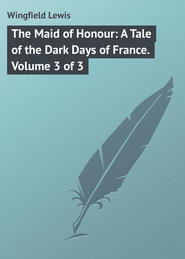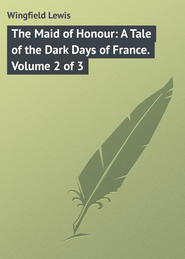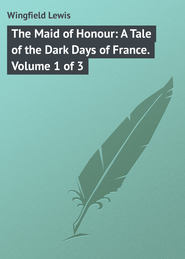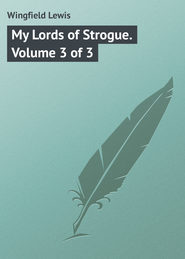По всем вопросам обращайтесь на: info@litportal.ru
(©) 2003-2024.
✖
My Lords of Strogue. Volume 2 of 3
Настройки чтения
Размер шрифта
Высота строк
Поля
Still my lord-chancellor vapoured airily of 'martial law;' not that it signified much practically whether such were declared or no, but it was as well to accustom polite ears to the words before they became legal facts.
The arch-conspirators being unaccountably set free, without any promises having been extorted from them, they naturally set to work at once to take advantage of the general simmering, and the peculiar condition of society was favourable to the attainment of their ends. More than ever now was the anomaly made manifest which has been hinted at before, namely, the promiscuous mixing in convivial intercourse of persons of the most opposite views. At time-serving Arthur Wolfe's, for instance, Clare hobbed and nobbed with the disaffected; such, that is, as had not gone so far as to frighten the well-meaning attorney-general. At Strogue Abbey, again, he chatted quite amicably with Curran, who was never weary of abusing him in Parliament, or strolled in the rosary with Cassidy, who was known to be a United Irishman. But the strangest scene of all was the Beaux-walk in Stephen's Green, more especially on a fine Sabbath, when the beau monde appeared in glory. The mall, where carriages paraded, ran at that time along the north side, between a low wall and an impregnable haha, or dyke; and there, on a Sunday afternoon, might be seen the strangest medley of muslins and chip hats, fine coaches and swinging noddies, mingled with cross-belts and helmets and military plumes and gear; might be heard the wildest diversity of opinions openly broached and bandied. Horse-races took place sometimes as an ostensible reason for the gathering, and none marvelled to behold those who were prisoned traitors a week ago arm in arm with Government officials, or to hear acquaintances joking each other on the inconvenience of getting hanged. Thus it failed specially to shock young Robert as a piece of bad taste, when, walking with other undergraduates, if a friend rallied him about his brother's newspaper, and the certain fate which must befall its owner; though it must be admitted that such was not the case with Sara, who moaned and shuddered with dismay, like a rabbit in a den of serpents. Tom Emmett's newspaper was openly published now twice a week, and no one interfered with it, though it sought out the joints of Lord Clare's harness; and the chief of the Directory was weak enough to imagine that his foe had grown afraid of him for his boldness in pointing at injustice. Other newspapers were gagged or bribed; why should his be privileged? Tom Emmett and Bond and the rest held their secret meetings as heretofore, and strolled in the Beaux-walk, and talked treason, like hot-pated Patlanders, to the top of their bent, oblivious of the claw of the cat, because it remained uplifted-poor guileless band of mice! They met frequently and talked earnestly, and squabbled not a little among themselves, for their opinions were divided on a point-a most important point, upon which unanimity was essential-no less a one than the grand basis of future operations.
Bond and Russell and others argued that misgovernment had come to such a pass, that it might be endured no more without merited disgrace. These bully squireens, these venal, brow-beating grandees, must be shown, before more harm was done, that there must be a bound to their arrogance.
If a tide be bravely stemmed, it will rage awhile; then settle within its limits. Were the French coming? French or no French, the people must rise; observant Europe would applaud, for even unfortunate heroism commands respect and pity; pike-heads by thousands lurked beneath potato plots, pike-poles in myriads were stacked under thatched roofs. Surely the spirit of the ancient kings would animate their sons in this emergency!
Most of the conspirators were for doing something definite at once. Tom Emmett and his brother were in favour of delay.
'We have waited so long,' Tom said, 'that a few weeks more will make little difference, save in the increased exasperation of the people. Lord Clare was obliged by public opinion to set us free. We must do our duty as men. With French assistance success is certain; without it, more than doubtful. Wait, at least, till Terence Crosbie's return-the young aristocrat who has taken up our cudgels. We shall be none the worse for waiting; and now that he has been baptised into the true cause, his presence will be valuable in our councils. The labourer who entered the vineyard at the last hour was not deprived of his reward. We are terribly weak in military capacity; maybe Heaven, who has awakened so late in the day a scion of a noble house, may point to him as a future leader. Wait at least and see him.'
Young Robert enthusiastically seconded his brother's motion, for his instinctive dread of bloodshed impelled him to postpone the decisive moment; and he was possessed, besides, with a strong belief in Terence, whom he had known intimately during his sojourn at the Priory. Russell and the others obstinately combated the point, urged thereto by youthful jealousy and wounded self-esteem. True, none of the council were of mature years; but to be lectured and prated at by this boy Robert, who was yet a student in Alma Mater, was an indignity which it behoved them to resent.
Doreen, who, after her noteworthy row upon the bay, threw aside the appearance of apathy she had assumed, saw this new danger with concern. Torn well-nigh to death already by factions of many kinds, was Erin to sit by and see her last forlorn hope, her last bodyguard of champions, scattered by the same curse? Miss Wolfe became seized by a frenzy for galloping across country. Her horses were constantly brought back to the stable with their coats turned, their flanks heaving, their skins reeking with foam.
'No doubt the girl was crazed,' my lady averred, as constantly as she marked the grooming of the animals from her bedroom window-seat. 'Why could she not ride like a well-brought-up young person in the green alleys of the Phœnix, or amble on the mall of Stephen's Green?'
My lady did not know that Doreen met separately, at certain cottages, the different members of the Directory; that she prayed and exhorted each one, as though he were alone to blame, to wisdom and a sacrifice of paltry vanity; and that she came away from each interview with such a dread of impending failure-a distrust of these budding generalissimos-that it required the most reckless gallops, with a dangerous fence or two en route, to calm her nerves sufficiently to meet my lady's scrutiny with the accustomed mask of composure on her face.
At the Abbey she had little to complain of now, for all were too busy to take much heed of her. Shane, with a prospect of departing northward, which rumours of accumulating outrages seemed to make more and more urgent, shilly-shallied and delayed, and selected guns and fishing-rods, and invited little knots of Cherokees, and spent more and more time at the Little House, as though the effort to tear himself away from Dublin delights and beloved Norah were too much for his resolution.
Under the circumstances he was not likely to trouble his cousin with attentions; and Doreen breathed freely again so far as her private affairs were concerned, for she perceived that this project of her aunt's was fading into a vision which never would and never could be realised. Any one who watched might see that Shane was desperately smitten with Norah, and Doreen was in no wise jealous. Norah was a nice girl, Doreen determined, who was worthy to become a countess, and she would help to make her happy as much as she could.
My lady's fancies were mere whimsies. If the marriage could be accomplished, she would of course come in time to like her new daughter-in-law. Many domineering old ladies object to eligible maidens, merely because they have not fixed on them themselves.
Miss Wolfe, in her regained independence of thought, felt half inclined to carry it beyond her own concerns, to speak openly to Shane, to go and call on Norah, or meet her as if by chance, and declare that she had come over to the enemy.
But the little love-idyl was destined to an interruption, whether she interfered or not; for Glandore was pledged to go to the north-to tear himself from the arms of metaphoric Capua. Would he remain faithful to his lady-love, when removed from the direct influence of her attractions? The notion of his going, Doreen remembered with a quiet sense of fun, was her own; and selfishly glad she was to have been so inspired, for away at Ennishowen his thoughts would be diverted into a new channel. Even if he did not learn there to forget Norah, his mind would certainly be freed from vague visions of his absent cousin. Thus she, in any case, would be safe. Situated as the concerns of the patriots were, all her own energies would be needed on the spot-for without some one to threaten and cajole, the bundle was sure to fall to pieces.
She would be glad, therefore, when the establishment at the Abbey should break up, when all the vans and horses and carriages should migrate to Donegal, leaving her-a waif-behind, with nothing to attend to but serious business.
Of course when my lady and her son started for Ennishowen, she would return to her old home in Dublin. She would inhabit once more her little bedroom in Molesworth Street, and would make herself so necessary to her father by fond artful prodigalities of love and tenderness, as to prevent him from ever allowing her to leave him any more. It was all very well, when she was a child, to send her to abide with her aunt, but now she was a woman, and her place was with her father. Then a small inward voice whispered, which caused her heart to beat quick time:
'What if, by my loving influence, I might change at length his views? He is weak, but so kind and excellent; he leans on my aunt because hers is the more masculine nature of the two; and he yearns for support and countenance. Why should he not come to lean on me? My will is as strong as hers-our mutual affection unstained by a difference, unruffled by a ripple! Oh! if I could persuade him that there are nobler aspirations than mere gathering of gold. That if, instead of money-grubbing to make me a fortune (well-meaning, tender father!) he would spend all he has freely for his country's sake, I would love him all the more dearly for my beggary; what if, by constant dropping on the stone of obstinacy, I could bring him to feel this-how happy, how truly happy, we might come to be together!'
Then, in less exalted moments of reflection, she felt that she deceived herself, that this might never be; that if she elected, in theory, to embrace for a holy cause the vow of poverty in her own person, she had no right to force her convictions upon a man whose glass of life was more than half run out, whose life ran in a groove, and who had so distinct a predilection for flesh-pots. Well, without going to extremes, it would be a joy to guide him just a little, to prevent his truckling too glaringly to Castle influence. If only he were not attorney-general and prosecutor for the Crown!' When the French expedition shall have arrived,' she thought, 'and swept this wicked Government into the sea, how intense a satisfaction will it be to say to the Irish Directory, "Spare at least my father, for my sake! I have worked heart and soul in the cause; you owe me this boon, the only one I ask of you!"'
Certainly, from every point of view it seemed necessary for the young lady to separate herself from the Abbey and her prejudiced aunt with all speed, and assume her proper place in her own home.
Hence for more reasons than one she looked forward to the forthcoming break in the Abbey ménage as to the commencement of a new era of reviving hope and usefulness, and quite longed for Shane's departure with all his bags and baggage.
CHAPTER III.
THE CLOVEN HOOF
My lady's preparations were completed at last, and, thanks to her maternal supervision, so were those of her favourite son. Though so close at hand, she went little into Dublin; for the sight of many strange uniforms reminded her of a past time, the associations connected with which she did her best to bury. She knew only, therefore, by rumour what was passing-by the reports of the Gazette, by conversations with Lord Clare. As for Curran, there was nothing to be got from him. He was as surly and morose as possible; said rude things about the Orange Societies; told her details of atrocities which, she felt sure, must be exaggerated; quarrelled with her about the scarlet woman; showed signs of becoming as bigoted on one side as she half admitted herself to be on the other.
She grew almost reconciled to the necessity of going northwards, for Shane's conduct gave her serious alarm. He almost lived at the Little House, and she saw the possibility, if the journey were delayed much longer, of his declining to go at all. For all Norah's influence was evidently thrown into the scale against her, and she bitterly regretted now having shot off that arrow at Crow Street.
The artful damsel was striving to instil into her lover's mind that it was cowardly to go away at this juncture; and it was only by pretending to have private intelligence from the chancellor that his mother could soothe his amour propre to sleep.
She was credibly informed, so she declared, that Paris spies had told Dublin spies, who had whispered it at the Castle, that the French fleet would certainly make for the north. It stood to reason they would not sail into Cork Harbour or Dublin Bay, where their foe was ready to receive them. Not a bit of it. They would make for the lonely, rock-bound coast of Donegal or Antrim, and young Lord Glandore would cover himself with glory by appearing at the head of the yeomanry in the neighbourhood to harass the landing of the troops.
This was just such a wild idea as suited the youthful fire-eater. He saw, in his mind's eye, the shattered vessels on his iron rocks of Ennishowen; a feeble resistance and surrender-for a mere handful could do anything on those cliffs-and gave way, as usual, to his mother. But she felt that, if they were to go, they must be off as speedily as possible, or even her influence would fail at the last moment, and that which she most dreaded might take place, despite her efforts.
Her indignation against the lady of the Little House knew no bounds. That she should immolate her own daughter for the mean purpose of revenging herself upon a rival, was too horrible! It was really amazing to consider what these Catholics were capable of! They had no consciences. They were ready to commit any enormity, because when it was done they could go to confession, wipe the stain off the slate, and come back smiling. Lord Clare was perfectly right about the scarlet woman, and Mr. Curran in his dotage. For every sort of reason these Catholics must be kept down. No punishment was bad enough for them-they should be locked in cages like wild beasts-they were absolutely incorrigible-at least, so thought the Swaddler. Doreen was turning out abominably. If she too were not soon caged, she would be running off some day with a groom-or a United Irishman, which was worse, breaking her father's heart, and dragging his name through the mire. She preached to her brother on this subject, making him very uneasy, and gave up looking after her poor, lest, meeting Mrs. Gillin, she might forget herself.
Her preparations were complete, yet still she lingered at the Abbey. Society was in such a state of suspense that freedom of action seemed paralysed. The lady-lieutenant was frightened, and talked of fleeing to London, yet she delayed her journey. The mall and the Beaux-walk were both as full as ever. People went thither in hopes of decided news one way or other-which never came; and being there, they rode and gossiped and joked, because it was the habit to do so.
Emmett and his friends were becoming grievously troubled, for the split in their camp widened daily. Were the French playing with their Irish allies? This continued inaction on their part was incomprehensible; for summer had faded to autumn, autumn was shrivelling into winter-it was almost too late to expect assistance now. Must the effort be postponed till next year? or a forlorn hope be attempted single-handed? To make it now would be madness, for rains were pouring down with Hibernian vehemence-the country was sodden-would soon be frozen-the exposed patriots would die off like rotten sheep. To wait till next year was a bad prospect-who can calculate what may happen in six months? The evil acts of the executive were piling up with terrible velocity. A sense of treachery and of dismay seemed to hang over the capital, for none could be certain who had taken the oath and who had not. Fathers were known to be loyalists whose sons had received the tonsure. Peasant mothers had put pikes in hiding whose daughters were living with the soldiers. Friends met and dined, and laughed with each other about the wide divergence of their views, just as they had done for some time past; but the feeling that though they differed their friendship would not wane was beginning to be shaken, for Major Sirr and his sinister band were abroad. No one was safe from the informer.
There was a dinner-party at the Abbey-a party of typical incongruity. The chancellor was there, all smiles and airiness. Mr. Curran was there, who was becoming strangely absent and sour; his little primrose Sara too, who looked delicate and nervous, and shrank, as if in pain, from conversation, which of course turned on politics. Cassidy was there too, in humble attendance on Doreen; and young Robert Emmett, whom the chancellor condescended to twit scornfully on his behaviour.
'Keep your head out of the noose, my dear young friend!' he said. 'No one is so small as to escape the vigilant eye of a paternal government. Do you suppose we are not informed of your pratings within Trinity? Your bursts of baby-eloquence, which are flowery but foolish? It is a harmless amusement possibly within those aged walls, and the wild talk of undergraduates is of little moment, yet I warn you that it will not be permitted much longer. Oh dear no! We won't do you the honour of arresting you. That would give you too much importance. But it may become my painful duty, as chancellor of that university as well as of this realm, to erase your name with others from its books, unless you mend your manners-that's all; so be warned and wise in time.
Robert chafed and choked at such language as this, which seemed to mark him for a schoolboy before his wistful love; but he stood in such awe of the stately dowager that he only reddened and hung his head. Then Lord Clare, feeling merry, felt disposed to break a lance with his ancient enemy of the Bar; he therefore gaily asked if he might take a glass with Colonel Curran of the Lawyer's Corps-whose military skill would soon be brought into play, considering that the paternal Government had decided at last to propose a suspension of Habeas Corpus. The United Irishmen were behaving so badly-were declaiming in so provoking a fashion about their bonds, that it was as well to show them for a moment what slavery really meant. But this pleasant little sally fell dismally flat; for Curran was already aware of this dreadful resolve, and did not rise in vehement expostulation, as the other expected. So had Doreen heard of it. Her eye brightened a little, but her hand never shook as she leisurely peeled a peach.
When the news had first gone forth, she had ridden over to the Priory, lest haply some one might be there who could advise what might best be done. She found Curran on his doorstep, putting on his gloves.
'I knew they'd do it,' was all he said to her. 'You stop here till I return. I am going to Mr. Grattan.'
Presently he came cantering back on his shaggy pony, and said to the anxious girl:
'There is nothing for it but patience. Mr. Grattan expected this, and so did I. We shall oppose the bill, but that will make no difference. This wretched land is doomed. If the bill is carried, Mr. Grattan will retire from parliament, and so shall I. We are both sick of the murderous farce.' Then, drumming his fingers on the window, in an attempt to keep down his agitation, he muttered forth at intervals: 'Habeas Corpus! the very last guardian of our liberties! They'll bring in the knife when every one's asleep, and stab our guardian in the dark!'
So the lawyer-not taken unawares-only smiled, and, bowing stiffly over his glass, asked quietly:
'Did you ever read Æschylus, my lord? I know you are a fine scholar. You always remind me of Mercury in "Prometheus Vinctus," who was constantly abusing the poor martyr for howling, when his only grievance was a stake of adamant through his breast!'
The party broke up early, as both of the elder gentlemen were due at the House, and the social atmosphere was stormy. My Lord Clare whispered to his old friend at starting that he would call round in the morning, as he had something very particular to say to her. Doreen took the opportunity of imploring Curran to send a message to the shebeen, with intelligence as to the fate of the bill (care of red-polled Biddy), that she might know from him what happened with as small a delay as possible.
That astute person turned out but too true a prophet. The bill which was to close the courts of law, and place power over life and property in the hands of military despots (and such despots!), was shuffled into the House by the attorney-general at 2 a.m., and read for the second time after grave and mature deliberation at 2.10 a.m.; and Doreen, when she read the note which informed her that it was carried by 137 against 7, had an extra douche of sorrow poured over her, in that her too facile parent had been its godfather!
So martial law was declared, and the humane and benignant soldiery, whose good feeling had already been proven at Armagh and elsewhere, were to work their wicked will unrestrained. Doreen was too much upset to appear at breakfast, so my lady picnicked alone on the window-seat which looked upon the stable-yard, watching for her vagrant darling, keeping a keen look-out, too, as to whether her niece went out for a scamper. For my lady had passed a sleepless night-one of those terrible nuits blanches much worse than any nightmare-when all our sins sit heavy on our chests; when our brains throb to bursting, and we hope there is no hereafter. She tossed-listening for Shane's return-growing more feverish as hour after hour passed silently. Still at the Little House! This was maddening. The vision of Shane and Norah arriving to throw themselves upon their knees, danced before her eyes. Once or twice, when sinking into a doze, she sat up with a start, clutching the luxuriant braids of white hair which gave her in her looking-glass such an odd look of winter and autumn united. Manfully she had quelled any shrinking on her own account about returning to Ennishowen. To her who had borne so much, what mattered a little extra suffering? It was excellent advice that her niece had given her. The way, and the only way, out of the labyrinth was to transfer the establishment en bloc; she had recognised the fact, and had resolved, for her dear boy's sake, not to spare herself. But now, in dead of night, when the past stood out in phosphorescent light, and the future loomed even yet more ghastly, she had to fight the old weary moral fight again, in which she had so frequently been worsted. Again she saw her husband on that bed of chairs at Daly's. Again she heard him say, ere the last rattle stopped his voice for ever, 'Make right that wrong while there is time!' Again she welled over with impotent rage, whimsically mixed with penitence, in that she must wear the Nessus shirt which he had shuffled off long since. She realised, as she ruminated, that she had been deceiving herself as to the motives which kept her still at Strogue. It was a terror of the island of Glas-aitch-é at Ennishowen-of the tales which each twig and shrub would tell her there-of the songs which the waves would sing to her as they dashed against the cliffs-which had really delayed her starting. But there must be an end of this weakness. All was ready. For Shane's sake she would like to start upon the morrow, for the sooner she drank her dose the better; but, unfortunately, a promise had been given to attend their excellencies at a great ball which was to take place at the Castle-and to retire suddenly, in ticklish times like these, would certainly be construed as big with political import. But after all, this fête (which was to show the scum that their betters did not fear them) would be past in a few days. Till that time arrived my lady would continue to wait; but in order to underline for herself in her midnight self-communing the determination that there was to be no more cowardice, she then and there resolved that the great coach should take them upon the very same evening within the Castle-yard, and spirit them forward on their way, instead of making a fresh start from the Abbey on the morrow. This resolution being come to, my lady's mind became calmer. As the blue light of wintry morning struggled in she felt quite relieved, and got up presently-as imperious as usual-to await Lord Clare's communication, and watch the stable-yard for Shane's return.
It was fully eleven o'clock before Lord Clare's carriage wheezed up the avenue-the casket which held Ireland's great man. For once Doreen had not bucketed forth on one of her wild rides. Shane had not yet come in.
My lady swept out upon the narrow terrace in front of the hall-door to receive her guest. He must stand in need of refreshment; what would he please to take?
He would take nothing for the moment. Yes-he would. It was a strange conceit in one who had visited there as a familiar gossip during so many years. He would take a view of Strogue Abbey-he would be shown over the mansion by its chatelaine. My lady was surprised. Indeed, she had not been over the quaint place herself for ages. What did my Lord Clare desire to see? Was it the dungeon? or the ancient kitchen and buttery, with its black woodwork, or the water-tower?
He would see everything while he was about it, he said. In the first instance the young men's wing, with its museum of fishing-rods and guns-and-what was that over it-an armoury? Oh, indeed! he would like to look at it.
'But perchance I should disturb the young gentlemen,' her guest said with hesitation. 'By-the-bye, has your son gone out?'
To Lord Clare's genuine astonishment, my lady reddened and looked away. Could she know the mission on which he had come? If so, then she was a greater mistress of her face than he supposed. If not, what troubled her? He forgot that shrined in her love there was but one son. That while he was hinting of the second, she, with sorrow, was thinking of the first-who was dallying-where?
The twain wandered in the young men's rooms-in Shane's, whose bed was smooth and neat-in Terence's, where faithful Phil was sitting, deeply engrossed in fly-making, as innocently as if he had never heard of a bough in England's crown.











